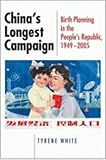China's Longest Campaign : Birth Planning in the People's Republic, 1949–2005 / Tyrene White.
Material type: TextPublisher: Ithaca, NY : Cornell University Press, [2018]Copyright date: ©2009Description: 1 online resource (320 p.) : 10 tablesContent type:
TextPublisher: Ithaca, NY : Cornell University Press, [2018]Copyright date: ©2009Description: 1 online resource (320 p.) : 10 tablesContent type: - 9781501726583
- 363.9/60951 23
- HQ766.5.C6 W485 2006eb
- online - DeGruyter
| Item type | Current library | Call number | URL | Status | Notes | Barcode | |
|---|---|---|---|---|---|---|---|
 eBook
eBook
|
Biblioteca "Angelicum" Pont. Univ. S.Tommaso d'Aquino Nuvola online | online - DeGruyter (Browse shelf(Opens below)) | Online access | Not for loan (Accesso limitato) | Accesso per gli utenti autorizzati / Access for authorized users | (dgr)9781501726583 |
Browsing Biblioteca "Angelicum" Pont. Univ. S.Tommaso d'Aquino shelves, Shelving location: Nuvola online Close shelf browser (Hides shelf browser)

|

|

|

|

|

|

|
||
| online - DeGruyter The Commander's Dilemma : Violence and Restraint in Wartime / | online - DeGruyter On the Threshold of Eurasia : Revolutionary Poetics in the Caucasus / | online - DeGruyter Phantasmatic Shakespeare : Imagination in the Age of Early Modern Science / | online - DeGruyter China's Longest Campaign : Birth Planning in the People's Republic, 1949–2005 / | online - DeGruyter A Common Stage : Theater and Public Life in Medieval Arras / | online - DeGruyter Economic Nationalism in a Globalizing World / | online - DeGruyter One World of Welfare : Japan in Comparative Perspective / |
Frontmatter -- Contents -- List of Tables -- Preface -- 1. The Collectivization of Childbearing -- 2. Jihua Shengyu: The Origins of Birth Planning -- 3. Planning Population Growth: The Political Economy of State Intervention -- 4. The Architecture of Mobilization -- 5. Two Kinds of Production: Rural Reform and the One-Child Campaign -- 6. The Politics of Mass Sterilization -- 7. Strategies of Resistance -- 8. Campaign Revivalism and Its Limits -- 9. Against the Grain: The Chinese Experience with Birth Planning -- References -- Index
restricted access online access with authorization star
http://purl.org/coar/access_right/c_16ec
In the late 1970s, just as China was embarking on a sweeping program of post-Mao reforms, it also launched a one-child campaign. This campaign, which cut against the grain of rural reforms and childbearing preferences, was the culmination of a decade-long effort to subject reproduction to state planning. Tyrene White here analyzes this great social engineering experiment, drawing on more than twenty years of research, including fieldwork and interviews with a wide range of family-planning officials and rural cadres.White explores the origins of China's "birth-planning" approach to population control, the implementation of the campaign in rural China, strategies of resistance employed by villagers, and policy consequences (among them infanticide, infant abandonment, and sex-ratio imbalances). She also provides the first extensive political analysis of China's massive 1983 sterilization drive. The birth-planning project was the last and longest of the great mobilization campaigns, surviving long after the Deng regime had officially abandoned mass campaigns as instruments of political control.Arguing that the campaign had become an indispensable institution of rural governance, White shows how the one-child campaign mimicked the organizational style and rhythms both of political campaigns and economic production campaigns. Against the backdrop of unfolding rural reforms, only the campaign method could override obstacles to rural enforcement. As reform gradually eroded and transformed patterns of power and authority, however, even campaigns grew increasingly ineffective, paving the way for long-overdue reform of the birth-planning program.
Mode of access: Internet via World Wide Web.
In English.
Description based on online resource; title from PDF title page (publisher's Web site, viewed 26. Apr 2024)


